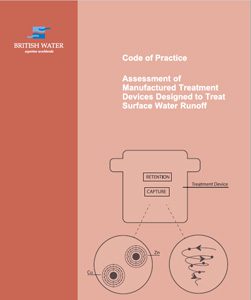
In a first for the UK water industry a code of practice for assessing surface water treatment technologies has been published by British Water. The document, which took over two years to develop, has been supported by the Environment Agency and manufacturers of surface water treatment devices.
British Water members ACO Technologies, Hydro International and Polypipe joined with the environmental regulator to sponsor an in-depth study of UK rainfall by research consultancy HR Wallingford. The information was key to the development of a robust product testing protocol.
British Water technical director Marta Perez said, “Standards are necessary to demonstrate how well proprietary devices used in sustainable drainage systems (SuDS) treat run-off and remove heavy metals from the water cycle. Until now, there was no standard for testing in the UK.
“Conducting tests overseas creates a heavy cost burden which was prohibitive for smaller UK manufacturers looking to sell at home. This code of practice defines the process necessary to measure the pollutant capture and retention capability of any device entering the UK market.”
The voluntary code of practice allows professionals delivering SuDS to apply a risk-based approach to minimising the environmental impact of the diffuse pollution from runoff. Verifying the capture and retention capabilities of different devices for a range of pollutants gives regulators, designers, specifiers and local authorities the information they need to select the most appropriate technology in a given application.
The tested devices are typically used to treat runoff from urban and residential hard-surfacing such as roads and car parks. Part of the code of practice is aimed at determining three functional requirements of treatment devices:
– Typical pollutant capture efficiency for frequent, sub-annual rainfall events
– Sediment retention capability for up to 1:2 year rainfall events likely to cause washout
– Capability of filter media to retain dissolved pollutants under the influence of de-icing salt
Ms Perez said, “The tests can be completed by the manufacturer or at a commercial test facility but must be witnessed by an approved independent UKAS-accredited third-party. British Water is now seeking a partner in the position to install and run testing equipment.”
Helen Wakeham, Environment Agency deputy director (water quality, groundwater and contaminated land) said, “At the Environment Agency we encourage the use of SuDS, and recognise that the right operational guidance is important.
“We have been pleased to work with the industry in creating its own code of practice. I am delighted to see the results, which will further support the implementation of SuDS in England.”
Approval and certification under the Code of Practice: Assessment of Manufactured Devices Designed to Treat Surface Water Runoff will allow manufacturers to demonstrate that their published capture and retention capabilities have been tested. The document can be accessed here.
LINK TO DOWNLOAD:
http://www.britishwater.co.uk/Publications/manufactured-treatment-devices.aspx







